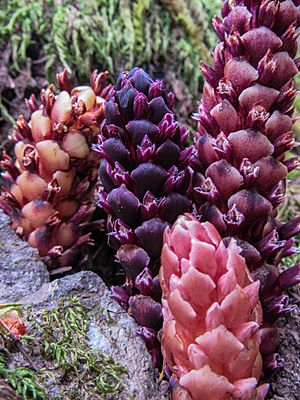Vancouver groundcone facts for kids
Quick facts for kids Vancouver groundcone |
|
|---|---|
 |
|
| Scientific classification |
|
| Kingdom: | Plantae |
| Clade: | Tracheophytes |
| Clade: | Angiosperms |
| Clade: | Eudicots |
| Clade: | Asterids |
| Order: | Lamiales |
| Family: | Orobanchaceae |
| Genus: | Kopsiopsis |
| Species: |
K. hookeri
|
| Binomial name | |
| Kopsiopsis hookeri (Walp.) Govaerts
|
|
| Script error: The function "autoWithCaption" does not exist. | |
Script error: No such module "Check for conflicting parameters".
Kopsiopsis hookeri is a special kind of parasitic plant. It's also known as the Vancouver groundcone or small groundcone. This plant belongs to the Orobanchaceae family.
Where It Grows
This plant is found naturally in western North America. You can see it from British Columbia down to northern California. It usually grows in areas with lots of trees, like forests.
About the Vancouver Groundcone
The Vancouver groundcone is a parasite. This means it lives off another plant to get its food. It attaches itself to salal bushes. It uses special parts called haustoria to connect to the salal and take nutrients from it.
You can spot the groundcone above the ground. It looks like a cone and can be purplish, brown, or yellowish. It usually grows to be about 3 to 6 centimeters long. Small, pale-colored flowers grow out from between its overlapping bracts (which are like small leaves).
Long ago, some native groups living near the coast would eat the potato-like base of the groundcone's stem. They usually ate it raw as a snack, not as a main meal.
Its Name Change
This plant used to be called Boschniakia hookeri. But scientists who study plants, called taxonomists, have learned more about it. Based on new evidence, they now place it in the genus Kopsiopsis. This change helps us understand how different plants are related to each other.
 | Claudette Colvin |
 | Myrlie Evers-Williams |
 | Alberta Odell Jones |

